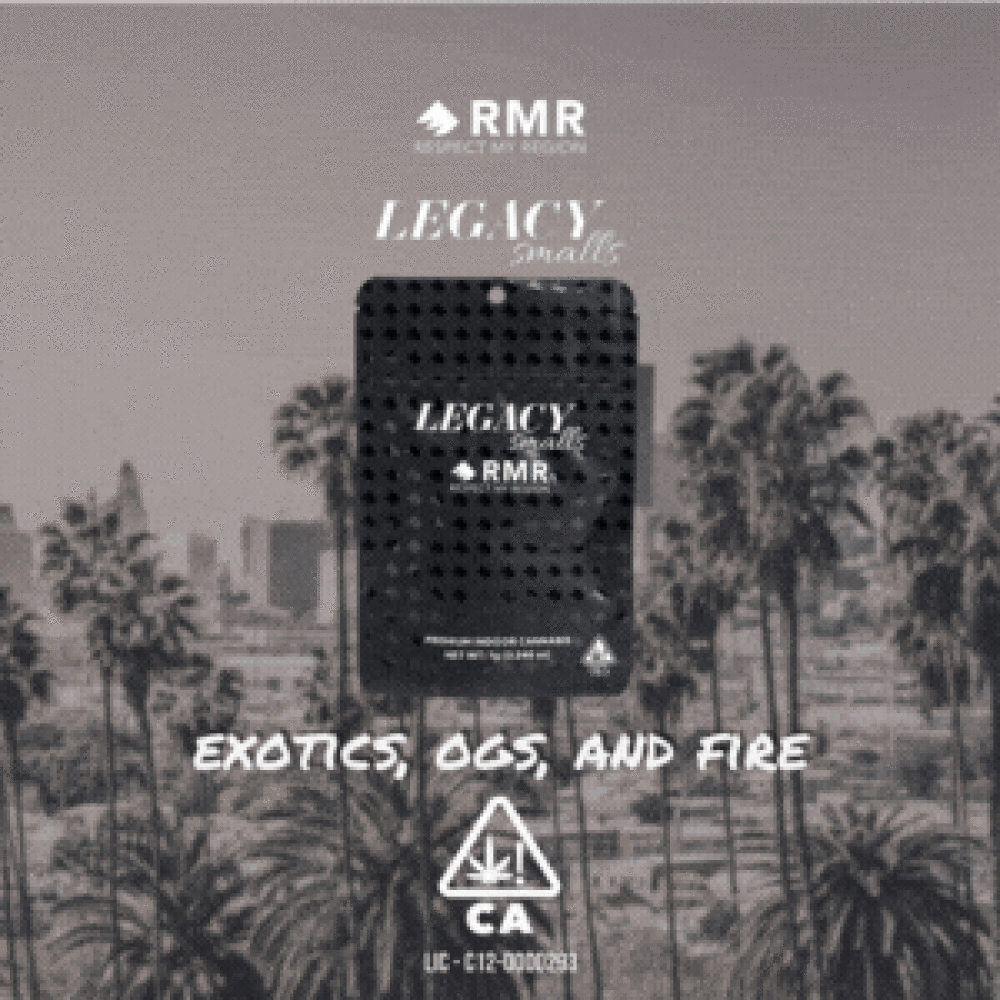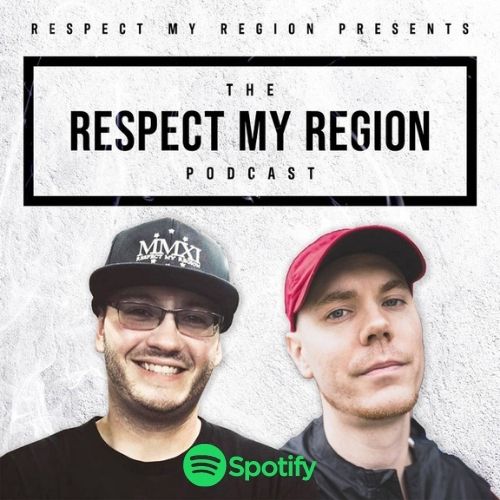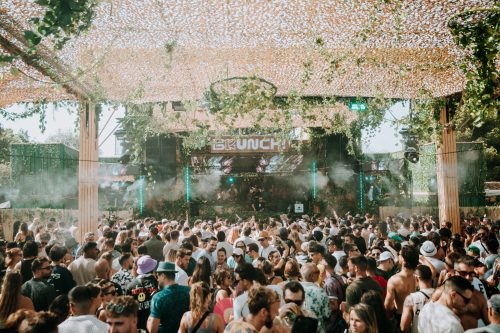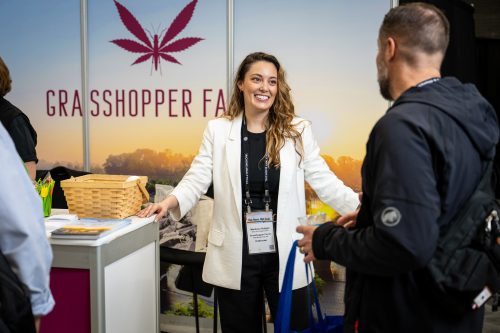On Friday, January 19th, I made my way through the doors of Fred Wildlife Refuge, an easily hidden gem of Seattle nightlife, tucked away in the middle of Capitol Hill. As I entered, I noticed a barrage of technicolor lighting, exotic bass-heavy sounds, and flocks of captivated event goers.
I gazed around, staring at the charged up faces of the crowd, noticing the different costumes and outfits, many of which were beveled at the center with a distinct white “W.” Suddenly, I felt a sense of content. WAVES Presents: Dark Matter was in full effect. I made my way over to the bar to grab a drink but had to stop myself to admire the stage as it came into view beyond the crowd.
An assortment of sharp angular shapes, like some sort of futuristic crystalline spacecraft, the stage appeared alive in colorful motion. Lasers shot out from each corner of the stage. On the walls surrounding it, I saw the names “Frida K,” and “Quackson,” lit up in patterned colors. At center stage were the two artists, hypnotizing the crowd with waves of digitized bass. Glancing up, I saw an aerialist moving gracefully above me, dangling on a crescent moon shaped aerial art piece that hung from the ceiling. All around me, people danced and shouted ecstatically. It was as if we had left the earth, and entered outer space.
I made my way over to the bar, grabbed a whiskey and coke and watched the rest of Quackson and Frida K’s set, reveling in the genuine art, talented performers, and vibrant energy of the crowd. Finally, their set ended, and excitedly, I made my way to the green room. As happy as I was to be near the stage, I had an interview with the main act. It wasn’t just an average DJ, either. Tonight, I was interviewing the neuro wizard known as Frequent.
https://www.facebook.com/WavesSeattle/videos/2134858926737918/
*The following are the transcripts and perceptions of Robin Hess, an artist interviewer at Respect My Region, based on a recorded interview, and they do not necessarily reflect Frequent’s exact quoting. The informational links at the bottom were added by the writer for educational purposes.*
RMR Interviews Frequent
RMR: Quote from site: “For years I have been working to push my sound design and composition skills in an attempt to leave my mark on the “neuro” community- a niche genre with heavy emphasis on impressive bass design and technical arrangements.” Tell me about neuro. What got you into that specific niche?
Frequent: Neuro compels me because it’s a genre that is unique for its complexity and abnormal structuring while being bass heavy and sharing roots in drum and bass. Starting off listening to dubstep in my younger years, I’ve discovered many artists who share a realm in bass-heavy dubstep or drum and bass, but neuro is special to me because of its ability to cross so many levels of intricate sound production. I want to follow their lead and also make something new and original in the neuro niche.
RMR: Recently, discovered your blog, a hidden gem for someone trying to get to know you as a producer. I read the most recent post, titled ‘Producer Envy.’ Basically, it discussed the issue of ego and jealousy, which can grow from lack of appreciation or the success of other artists. In the blog, you talked about mitigating these issues and keeping yourself in check. Could you sum up that idea for me, and why you feel that it can be such a big problem in the artist realm?
Frequent: Basically, the point I was trying to make in that blog was that artists need to have a group mentality, by supporting each other whenever possible. The difficulty is, when you watch someone close to you surpass you in an art, or become more well known, it can be frustrating. You might begin to feel unappreciated or left behind, especially if you have been producing longer, or deem yourself to be a better producer. You could start thinking things like, “this guy was never as talented as me,” or, “It should be me getting noticed for my music, not him.” This can happen in many walks of life, but it’s especially common in such a difficult industry as music. I believe that, in order to be both successful and happy, it’s important to recognize and self-mitigate those issues.
It’s important to be open and encouraging of other peoples successes, and respect their abilities, even if it’s in another genre that you don’t familiarize with, or a related area of the industry that you don’t specifically focus on, like graphics production. Not only will you feel better about helping and encouraging your peers, but the music industry is a small world, and you never know who you might end up working with, or what artists might give you that leg up that you need to reach the industry spotlight. Don’t get me wrong, it’s ok to be a critic, to a degree, but it should always be done so constructively. The goal in mind should be to build a group mentality.
RMR: Your recent album, “Dream Recall,” really took me for a ride. There were so many different elements built into the album itself, and I felt a strong sense of storytelling going on within the context of the music. Can you tell me anything about the theme of this album, and the inspirations you drew upon in order to create it?
Frequent: Dream Recall was based on the concept of the dream state versus the wakeful state, and the many parallels created from other mind-altered states, such as lucid dreaming, and psychedelic use. At the focus of Dream Recall was one question: “What is a real experience?” Through these conscious exploring practices, I became aware fairly early on in my life that our idea of reality may not be as simple or straightforward as we believe.
Let me give you a simple example. If you are dreaming, normally you don’t realize that you are actually asleep. You think the dream you’re in is real. Sitting here with you now, how am I supposed to know that I am not really asleep, and dreaming all of this in my head? We just “know” that we are awake. Except, really, we don’t. We assume that we know our state of being because our perceived reality seems real enough to believe and accept as real.
Put simply, and without going into anything too theoretical, it seems obvious that there are many more layers to life and consciousness than what we are aware of. Our senses only pick up a portion of the world around us. Science would regard that as being fact. In Dream Recall, my focus was to explore the parallels between these different states of mind, and the concept that we are always riding this fine line between having control of our reality and losing it. My hope is that, with this album, I can inspire curiosity onto the mysteries of life and consciousness.
https://www.instagram.com/p/BQ_SW4zhdQz/?taken-by=frequentaudio
RMR: For people that aren’t aware, can you tell me more about lucid dreaming and psychedelics? What can you tell me about your personal journey of exploring your conscious, and why do you think it has benefited you as a person or artist?
Frequent: I’m a big advocator of exploring one’s own mind. When I was younger, around high school, I became very interested in lucid dreaming. For those who are unfamiliar with lucid dreaming, it is basically when you train yourself, through various mental cues and observational practices, to become aware of your own dream state. It’s definitely a fascinating introspective experience that can teach you a lot about yourself. The only thing is, it’s very demanding. You have to record dream journals and train yourself to do reality checks. There’s a lot to be gained from it, but I found that over time it turned sleep into a project, which was, ironically, tiring.
Soon after I decidedly stopped lucid dreaming, I discovered psychedelics; specifically LSD. With that, I began exploring a new parallel between lucidity and non-lucidity. Although psychedelic substances can be dangerous and should be handled with responsibility, I have to be honest with the fact that Psychedelics have offered me a window to self-exploration and self-awareness that would otherwise be very hard to achieve. They have given me perspective and inspiration in my music, and almost every area of my life. I even wrote half of the opening track to Dream Recall, while tripping. I’m not necessarily advocating drug use for anyone, but I think it’s important to make people aware of the usefulness of psychedelics, instead of demonizing them. These substances do have the potential to put you into a dark place, a place you might feel like you can’t control. Although, if you just accept it for what it is, those dark places can also lead you somewhere new and thought-provoking. There are, however, plenty of alternative methods of self-exploration out there as well. The easiest method that anyone can practice, which is healthy, safe, and advocated for anyone, is meditation. I would say that lucid dreaming is a step beyond that, and hallucinogenic use, a step further.
RMR: What was your biggest challenge in creating Dream Recall?
Frequent: My biggest challenge was figuring out how to end it. The entire time I wrote that album, I knew that it would all have to lead up to that final moment of perfect wakefulness, awareness, lucidity, or whatever you might call it. For that reason, the last song was quite a challenge for me to take on. I spent many many hours trying to figure out how I would reach the final “wake up” sequence. When I finally created the ending I was content with, I discovered that it wasn’t soo much that final moment that had mattered, but the entire journey leading up to it. I suppose it’s kind of a good life lesson; focus on the journey and not the destination.
RMR: Are you religious or “spiritual” in any way? What is your view on death and the afterlife, and how do these concepts tie into your music, if at all?
Frequent: I wouldn’t say that I’m spiritual, and I’m certainly not religious. My thoughts on religion are that it was created to explain something that nobody could or can explain. Just as people can’t explain a hallucinogenic-induced state, we cannot explain the afterlife, the near-death experience, or any of these so-called mystical anomalies that exist in nature. I acknowledge that these things can’t truly be explained, but at the same time, I believe that methods of self-exploration, in addition to scientific experimentation, could get us closer to one day understanding these states of being.
I have no Idea what the afterlife holds. As far as the concept of god, I suppose it’s possible that there is some sort of intelligence within the universe which guides it. Of course, in the end, it’s important to remember that nobody fully knows the answer to these questions. The universe is a colossal mystery. You just have to accept it and find your own meaning.
RMR: As an artist, what were some of the biggest challenges in getting to where you are now? Was peer pressure an issue? Did you ever have to quit a valuable job, or go against the wishes of your family or friends, in order to get where you are today?
Frequent: My family has always been very supportive of me, which I owe a lot of my success to. However, I did hit a fork in the road halfway through my first year of college, when I realized that I either needed to focus on myself as a serious artist or put music on the backburner and manage myself in school. I knew that I could either get a degree and a good job or focus on music as my career without any certainty for where it would lead me. I decided to take a chance and focus on music.
My parents still supported me, but at the same time, they were concerned. For a while, they were watching me scraping by and were worried about my future. Luckily, I put in the work and the cards fell in the right place. I don’t have any regrets. I feel much more fulfilled creating music for a living. I will admit though, music becomes a bigger challenge when it is your job, and your sole source of income. It becomes everything. Although, after living this lifestyle, I feel confident and toughened to it. I couldn’t ever see myself turning back to school or a regular job.
RMR: I took a look through your Instagram recently, and saw one picture of you from back in June that made me laugh. It was captioned, “Smokes weed with python.” Personally, I’ve never smoked weed with a python wrapped around my neck before. I think I might get a little paranoid! Was that your python? How did it feel getting high and having that thing wrapped around you?
Frequent: That was my friends’ snake! Yeah, it was an interesting experience having that Python curling around my whole body! Haha, that thing was huge! I did feel a bit claustrophobic, but at the same time, there was nothing for me to be worried about. It’s amazing and humbling to feel the strength of a creature like that.
RMR: What other hobbies do you enjoy in your free time, when you aren’t producing music?
Frequent: I love visual art, photography, graphic design, etc. It’s my favorite thing to do when I’m not writing tunes. Sometimes I like to go out and explore, hike around and just take pictures of nature. It’s nice to have another creative outlet that doesn’t come with any added pressure.
https://www.instagram.com/p/BRroKH3Bg_T/?taken-by=frequentaudio
RMR: What are your thoughts on WAVES? How have you enjoyed the event here, thus far?
Frequent: So far, I love it! I haven’t had a lot of time to take it all in, seeing as I just flew into Seattle today. Although, I’m impressed with what I’ve seen so far, the stage and art design. Jackson and the other WAVES Residents have been very accommodating and a pleasure to be around, and that stage they’ve built is amazing! I’m excited to see how the rest of the night goes.
RMR: Alright, I’ve got one last question for you. For all the young artists out there who are aspiring to produce music, what advice might you give them?
Frequent: That’s a tough one! One thing that has helped me the most on my journey as an artist has been valuing my free time and using as much of it as I can to practice building my skills. For the younger people listening, it’s even more important that you learn the value of your free time early on. The younger you are, the fewer distractions and attachments you have. Try not to think in terms of, “This thing needs to happen right now!” Honing a skill like this takes time, and the more time you put into it when you’re young, the better off you will be in the long run. The last thing you want to do is jump the gun and try to assert yourself as something highly calculable before you actually get to that level. Stay as humble as possible and focus on your art.
You also need to be realistic. You need to learn about the scene and become a part of it. Like my blog post said, support other artists, have a voice on social media and make people know who you are. Realize that this whole thing is a team effort, as much as an individual effort. You have to make connections in the music industry and understand its inner workings. Try to identify your image, and figure out what sets you apart from the rest. Build on that, and make sure you truly have something to offer.
I won’t sugar coat it, if your goal is to become a famous producer, the odds are against you. If you think music is the thing that will make you the happiest, then, by all means, do it. Do what makes you happy. Remember though, it’s ok to just make music as a hobby as well.Whatever you do, stay open to new experiences. You may find that, down the road, you want to do something different with your life. Always keep your options open, and hold on to the connections you’ve made.
The truth is, in this industry, nobody owes you shit. You aren’t going to get a free handout. There are no guarantees, just opportunities. Work hard and follow your passion. If you create something that’s turning heads, people will notice and respect you for it. If not, you still got to do what you love.
Follow Frequent On Social Media
Instagram | Twitter | Facebook | SoundCloud | Youtube | Tour Dates

After the interview, I went back out to the crowd to watch the rest of the show and mingle with friends. Again, I was perplexed by the jaw-dropping visual artwork. I had an amazing time catching the rest of the sets, and Frequent’s most of all.
9:00-9:45: Quackson b2b Frida K
9:45-10:30: Haelix b2b Austeele
10:30-11:15: Korra the Kid
11:15-12:00: Subsonic Drops
12:00-1:00: Frequent
1:00-close: Kumarion
Frequent’s set blew me away. It was very wonky and unorthodox, a weird sort of unpredictable style that left me perplexed and fascinated. The subtle variations that he threw into his time signatures were intricate and oddly appealing. Every time I thought that the music was going completely out of whack, he would make some subtle shift into a new beat, and it amazed me.
It was easy to tell apart the producers in the crowd while Frequent played because they were even more perplexed than the rest. I noticed them admiring his set, looking curiously back and forth at each other, trying to break down the logistics of each transition. Frequent definitely had the dance floor moving, not thrashing like a heavy dubstep vibe, but grooving in a neuro symbiosis of funk.
After the show finally ended, I stepped outside to cool off. That feeling that I’d had earlier, of appreciation for the genuine talent and art of WAVES, was with me now more than ever. The night had left me with this feeling that I sometimes get after events, where everything felt just right. Despite the troubles that might be waiting in our everyday lives, despite thoughts of anxiety, indecision, frustration, or doubt that can so easily leave us distraught, during that night, everything felt ok.
Maybe, I was just feeling a little giddy after a successful interview and a fun night out. Still, I’d rather believe that there was something magical going on that night. Reflecting on my interview, and everything that Frequent had spoken about in respect to ego, self-exploration, and following one’s dreams, I couldn’t help thinking that he was on to something. It might have been just the inspiration I needed in my own life. Chasing your dreams isn’t an easy thing to do. Nobody owes you anything, and there are no guarantees you will find success. Still, more frequent than not, you will be glad you did.

*Frequent and Respect My Region do not condone the use of psychedelics or the practice of lucid dreaming, but we do encourage educational awareness. If you’d like to learn more about lucid dreaming, psychedelic use, meditation, or other practices of self-exploration, I suggest starting with some of these links below. If you wish to use these methods, please do so safely and responsibly, and with the guidance of an experienced observer.*
Sensory Deprivation – Joe Rogan Talk
FOR MORE COVERAGE OF FREQUENT AND WAVES PRESENTS, FOLLOW RESPECT MY REGION ON FACEBOOK & TWITTER.
HAVE A STORY WE SHOULD COVER? EMAIL US.
Photo’s courtesy of Holly Singh, Conor Reiland, Jason Windham, and Vivid Aerial Ascent.









